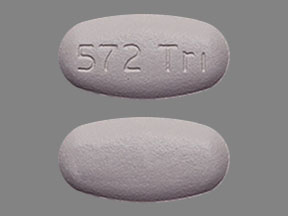Triumeq and Alcohol/Food Interactions
There are 6 alcohol/food/lifestyle interactions with Triumeq (abacavir / dolutegravir / lamivudine).
Alcohol (Ethanol) Abacavir
Minor Drug Interaction
Information for this minor interaction is available on the professional version.
Multivitamins With Minerals Dolutegravir
Major Drug Interaction
Dolutegravir and multivitamin with minerals should not be taken orally at the same time. Products that contain aluminum, calcium, iron, magnesium and/or other minerals may interfere with the absorption of dolutegravir and reduce its effectiveness in treating HIV infection. You should take dolutegravir at least two hours before or six hours after the multivitamin with minerals dose. Talk to your doctor if you have any questions or concerns, or if you have trouble separating the dosing times. Your doctor may be able to prescribe alternatives that do not interact. It is important to tell your doctor about all other medications you use, including vitamins and herbs. Do not stop using any medications without first talking to your doctor.
Dolutegravir Food
Minor Food Interaction
Information for this minor interaction is available on the professional version.
Lamivudine High Cholesterol (Hyperlipoproteinemia, Hypertriglyceridemia, Sitosterolemia)
Major Potential Hazard, Moderate plausibility
NRTIs - pancreatitis
The nucleoside reverse transcriptase inhibitors, didanosine, stavudine, and lamivudine, may cause pancreatitis. The incidence is generally low but is up to 7% with didanosine, and up to 18% in pediatric patients given lamivudine. Patients with a history of or known risk factors for pancreatitis (such as alcohol abuse or hypertriglyceridemia) should be monitored closely during therapy with these agents. Therapy should be discontinued at the first signs/symptoms suggestive of pancreatitis (e.g., nausea, vomiting, abdominal pain, hyperamylasemia with dysglycemia, rising triglycerides, decreasing serum calcium), and preferably permanently discontinued if clinical pancreatitis develops.
References
- (2019) "Product Information. Epivir (lamiVUDine)." ViiV Healthcare, SUPPL-39
- (2018) "Product Information. Videx (didanosine)." Bristol-Myers Squibb, SUPPL-54
- (2018) "Product Information. Zerit (stavudine)." Bristol-Myers Squibb, SUPPL-41
Abacavir High Blood Pressure (Hypertension)
Moderate Potential Hazard, Moderate plausibility
abacavir - cardiovascular disease
Some clinical trials have reported increased risk of myocardial infarction in patients treated with abacavir. Although some of the findings are inconclusive, as a precaution, the underlying risk of coronary heart disease should be assessed before therapy, and action should be taken to minimize all modifiable risk factors such as hypertension, hyperlipidemia, diabetes mellitus, smoking, etc.
References
- (2001) "Product Information. Ziagen (abacavir)." Glaxo Wellcome
Abacavir High Cholesterol (Hyperlipoproteinemia, Hypertriglyceridemia, Sitosterolemia)
Moderate Potential Hazard, Moderate plausibility
abacavir - cardiovascular disease
Some clinical trials have reported increased risk of myocardial infarction in patients treated with abacavir. Although some of the findings are inconclusive, as a precaution, the underlying risk of coronary heart disease should be assessed before therapy, and action should be taken to minimize all modifiable risk factors such as hypertension, hyperlipidemia, diabetes mellitus, smoking, etc.
References
- (2001) "Product Information. Ziagen (abacavir)." Glaxo Wellcome
Triumeq drug interactions
There are 207 drug interactions with Triumeq (abacavir / dolutegravir / lamivudine).
Triumeq disease interactions
There are 8 disease interactions with Triumeq (abacavir / dolutegravir / lamivudine) which include:
- hepatitis B
- hepatotoxicity
- pancreatitis
- cardiovascular disease
- hemodialysis
- hepatitis
- liver impairment
- renal dysfunction
More about Triumeq (abacavir / dolutegravir / lamivudine)
- Triumeq consumer information
- Check interactions
- Compare alternatives
- Pricing & coupons
- Reviews (126)
- Drug images
- Side effects
- Dosage information
- Patient tips
- During pregnancy
- Support group
- FDA approval history
- Drug class: antiviral combinations
- En español
Related treatment guides
Drug Interaction Classification
| Highly clinically significant. Avoid combinations; the risk of the interaction outweighs the benefit. | |
| Moderately clinically significant. Usually avoid combinations; use it only under special circumstances. | |
| Minimally clinically significant. Minimize risk; assess risk and consider an alternative drug, take steps to circumvent the interaction risk and/or institute a monitoring plan. | |
| No interaction information available. |
Further information
Always consult your healthcare provider to ensure the information displayed on this page applies to your personal circumstances.


